My best friend’s killer got away - until I made police try again
- Published
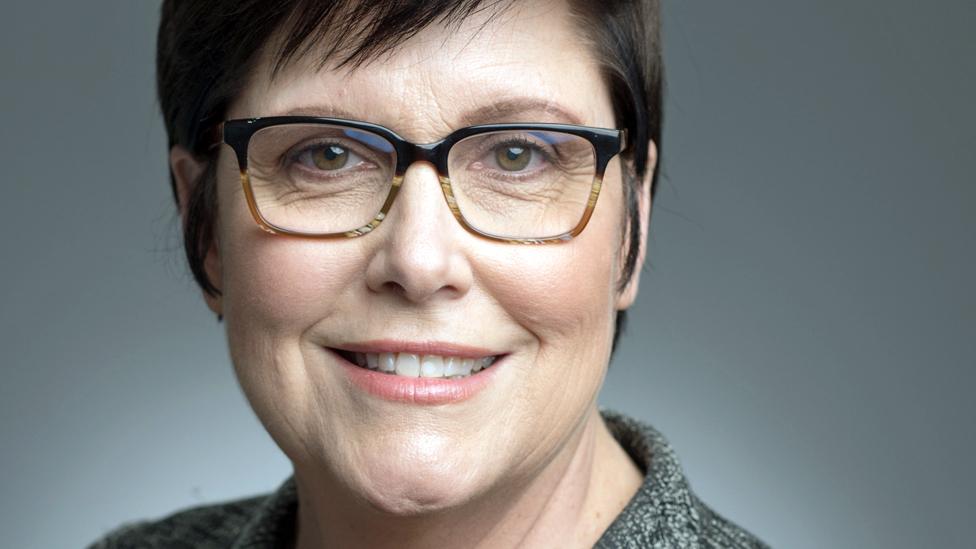
Sheila Wysocki and Angela Samota met in 1982 on their first day at university in Dallas, Texas. They shared a room and became great friends, but two years later, at the age of 20, Angela was brutally killed. Decades passed and the murderer was never found, until a vision prompted Sheila to get the case reopened.
When the phone rang I ran to my room. I picked it up and on the other line was Barbara - a friend of Angie and mine - and she was crying. Through her crying she said there had been an accident.
Barbara kept crying - hysterical crying - and so after a few minutes, I don't know why, I just said, "Is she dead?"
Angie had been found in her bedroom in the wee hours of the morning - she had been raped and murdered. It was a very violent stabbing, it was horrific. I remember screaming because my mother came in and when I got off the phone, through my tears I told her what had happened.
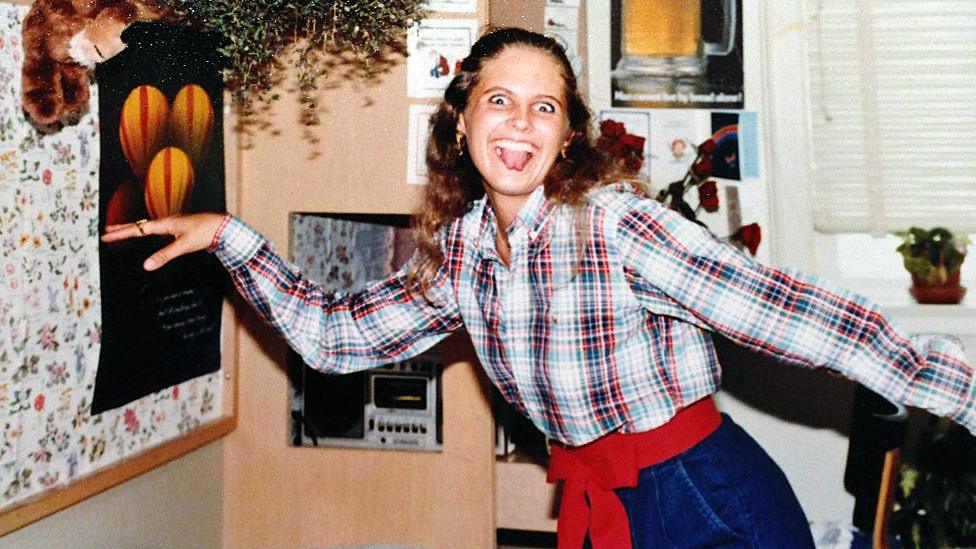
Angie had a beautiful smile, the biggest I've ever seen, the type of smile that would light up her whole face. She was very vivacious and friendly and one of the few girls in the computer science and electrical engineering department. She was the triple threat - great personality, real cute and smart.
The first semester we didn't get along that well because she had a boyfriend that I did not care for, but when they broke up we became pretty close. We both grew up without dads and we bonded over not having fathers in our lives.
Angie was very academically inclined and she would study late into the night, but I'm dyslexic and was struggling and just hoping to get through college. We were polar opposites. I'm an observer - I'm friendly, but I'm not going to be the centre of a room.
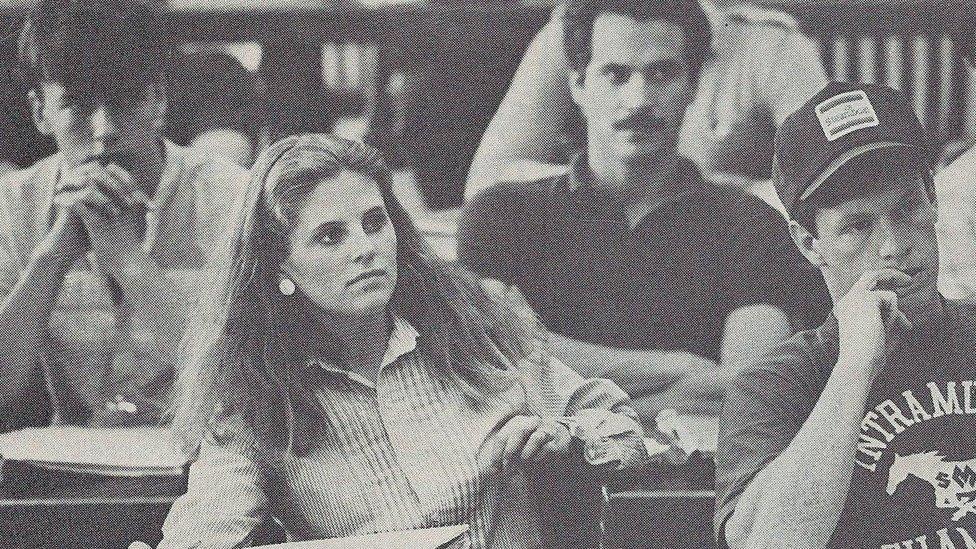
I finally went down to the police station and I sat down with the detectives. They had the files out and they asked questions - did I know this person or that person? Did I know where she did her grocery shopping? Did I know her schedule?
And they had pictures. There's one I remember of Angie on the bed - there was blood everywhere and her eyes were open. To this day I still remember how horrible it was. It was quite traumatic.
From what I understood from the police they believed that Russell Buchanan was the guy who had done it. He was probably four years or five years older than us, not that much but he was already established in his profession. He was an architect and Angie realised that Russell would be a good connection - Angie was great at networking. Russell was a shy guy, so she invited him to go out with her and another friend dancing that night.
One time I called the police to check in and I said I didn't know what it was about Russell, but he made me feel uncomfortable. What I didn't realise was that everybody made me feel uncomfortable at that point - I was numb, it was probably a year before I really started feeling things again.
I think I would have done just about anything to help and with encouragement from the police I started having conversations with Russell to ask him about that night and to see if he told me something different than what he had told them.

Find out more
Sheila Wysocki spoke to Outlook's Jo Fidgen on the BBC World Service. You can listen again here.

And then we decided to go out to dinner - I remember my mom flipping out - but Russell came and picked me up and we went to a place called August Moon. I was nervous and not acting like myself, thinking, "I'm sitting next to a murderer" - because, of course, I thought he did it because the police said he did it.
Afterwards, when I talked to the detective I said, "His story is the same, it's what he told me before," but they had him come down and take a lie detector test and kept bringing him down for interviews.
Then I was told that Russell had stopped co-operating and that he had lawyered up. Back in Texas in the '80s there was this real famous attorney called Richard "Racehorse" Haynes and if you got Racehorse Haynes, by God, you were guilty. I was told that Russell got Racehorse Haynes - so, of course, he's guilty - but there was no physical evidence that they could put on him and he was not charged.
I'm a very curious person, so I was thinking, "Who did it? How did they do it? We've got to get the person, they have to pay for this."
Angie's murder was the most traumatic event of my life and I didn't know what I was supposed to do. I slept on the floor in my mom's room for quite a while. I had changed that day, my innocence was gone. I never went back to college.
I was still meeting the detective - we would go to a bar named Snuffers and a bar called Cardinal Puffs and we would talk about the case - I don't drink, but he did - and when I got married in 1988 I was still in contact with him and invited him to my wedding, that's how much I knew this guy.
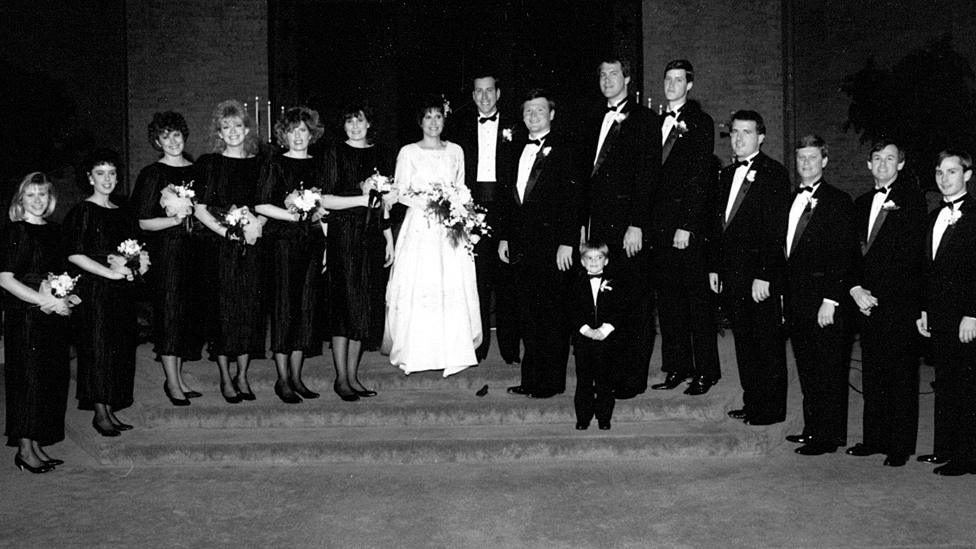
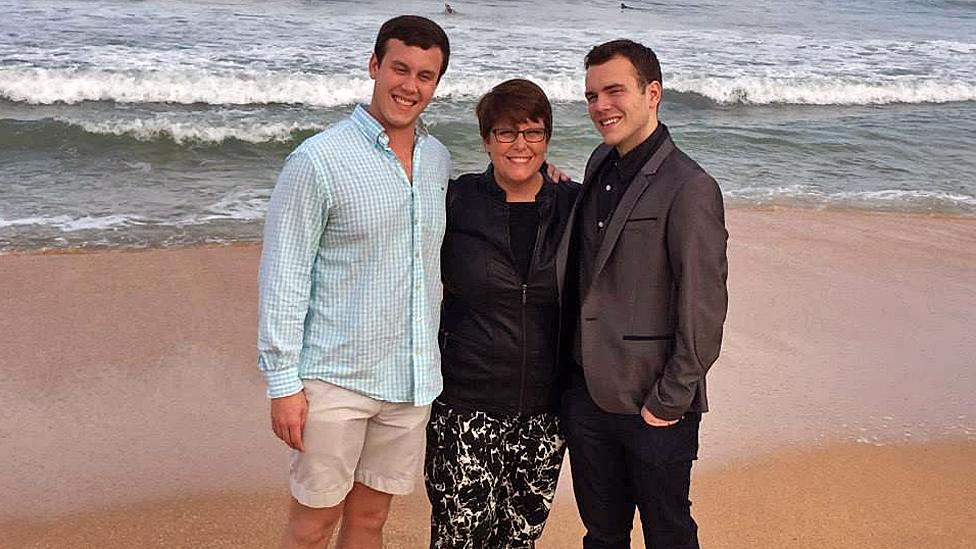
By 2004, 20 years after Angie was murdered, we had moved to Tennessee and I had two sons. One evening I was doing Bible study homework. I dreaded doing it. Whoever designed it did not design it for someone who's dyslexic - small print, close together, very tight - it's torture for me to read.
So I was reading and then I remember looking to the right and there was Angie. I thought, "Am I dreaming? Am I asleep? What is it?"
There was no talking, it was just her and her great smile.
I don't know if I believe in ghosts, but I have a lot of faith and I believe that there are messages, and at that moment I thought, "It's time." I leaned over to my nightstand and picked up the phone and called the Dallas Police Department, just like that.
I said, "Can I talk to the Cold Case division?" And they said, "No, you have to talk to Homicide, there's no designated Cold Case division." So I asked for the detective that I knew and left a message.
Sheila describes the moment she saw Angie and what happened next
He never returned any of my phone calls - this guy knew me well enough for me to invite him to my wedding, but he never called me back, ever. Over a period of time I called probably 700 times and he blew me off - I'm a little bitter about that.
But probably the most heartbreaking part of making all those calls was that they said that not one other person in 20 years had called. Think about that - not one person. How can someone die such a violent death and no-one call and want to know why and want to know who? That still makes me cry.
I think they thought that I'd eventually go away - most normal people would drop it and move on with their life, but I didn't. I thought there was something that just didn't feel right, and I just didn't take no for an answer. So I kept calling.
I did the research and printed out reports about all the rapes that had happened during that period, the locations, and who was arrested to try to figure out what had happened.
We lived in a gated, guarded community and one day I was complaining to the head of security there about being blown off constantly by the police and he said, "You know, you'd make a great private investigator."
I didn't even hesitate. It was 2004 and I was in my early 40s and that night I told my husband that I was going to become a private investigator.
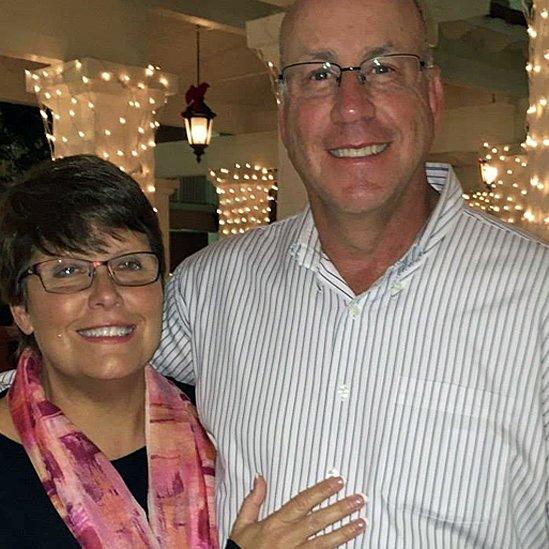
To become a private investigator in Tennessee you have to be sponsored by a company - I was lucky because our security guys were going to sponsor me and train me - they were fantastic. At night after dinner my oldest son would read all the Tennessee laws that I had to know to me and I'd have to say them back to him. I acted like I was about to attend Harvard or Yale, but by the time I got to the private investigator exam I knew it.
I learned about cyber bullying, copyright laws on the internet and cheating spouses. Once I had passed the exam, I stopped going to cocktail parties because we were investigating my neighbours or some of them had hired me, and when you know people's personal lives it's very uncomfortable to be in social situations where they want to talk about stuff that you can't talk about. But I loved it.
Now that I had my private investigator licence I thought that the police would sit down and work with me. How stupid was I? They couldn't have cared less.
But they were so sick and tired of me by this point that they re-opened the case. They gave it to a female detective to deal with, and she did not blow me off - when she called me she had the file, she knew the case, she had done her homework and knew that Russell Buchanan was the number one suspect. But the thing that shocked me most was that she said they had the evidence.
I knew that they had done a rape kit on Angie but had been told that the evidence had been lost in a flood, and now - how many years later? - they have the evidence. Are you kidding me? I was floored.
They had Angie's fingernails - so she obviously fought back - which is DNA. They had semen - DNA.
I was so excited because I knew that was going to be the key - in 1984 DNA testing was in its infancy, but more than 20 years later it was already a powerful forensic tool. There is a process you have to go through, however, and the police department at that time had to do a request. That was probably 2008 and we got the test results in 2009. These cases are not quick.
I picked up the phone and it was the female detective and she said, "We got him."
I was waiting for her to say, "We got Russell Buchanan," the one I knew did it because they told me he did it. So when she said the name I went through the Rolodex in my head, going, "Wait a minute, I don't know that name."
I call him The Beast. He was a serial rapist out on parole when Angie was raped and murdered.
The case boiled down to the physical evidence, the DNA, which matched The Beast - the advancement of science since her murder made his conviction possible. I went to the trial 650 miles away in Dallas to see Angie get justice, and now he's off the street I think him rotting in jail with a life sentence is OK with me, but it doesn't change anything, she's still dead.
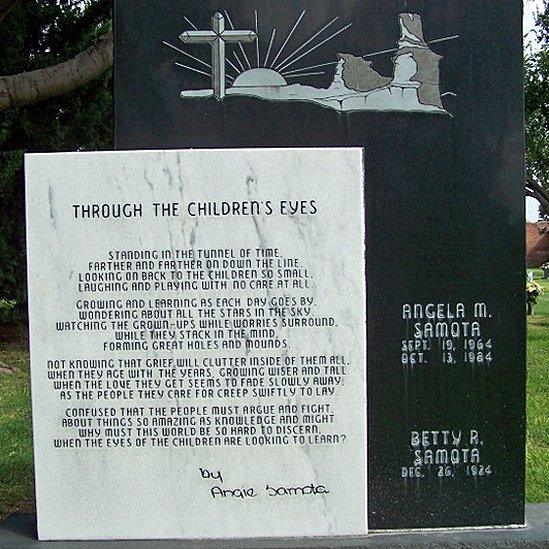
Once Angie's case was finalised I was going to retire my private investigator licence and move on, but then I started getting letters. When I got the first few I was kinda surprised. I called the people and walked them through what I thought they needed to do, and then I started getting more and more so I thought, "I won't retire my licence just yet."
After the trial I called Russell and said to him, "I want to meet you and talk to you about the past."
So after all those years of being really angry - I mean, I hated the guy because I thought he was the murderer and yet he'd gone on to live this great life and do well - I asked for forgiveness. And later Russell and I went to Angie's grave together.
He's a great guy, he's the most incredible human being and he thanked me for being persistent and helping to find the truth, because he said the cloud of suspicion is finally off him.
Donald Bess was sentenced to death in 2010 for the rape and murder of Angela Samota in 1984. He remains on death row.
The Dallas Police Department did not respond to the BBC's request for comments on Sheila Wysocki's remarks about their investigation.
Written by Sarah McDermott

You may also like:
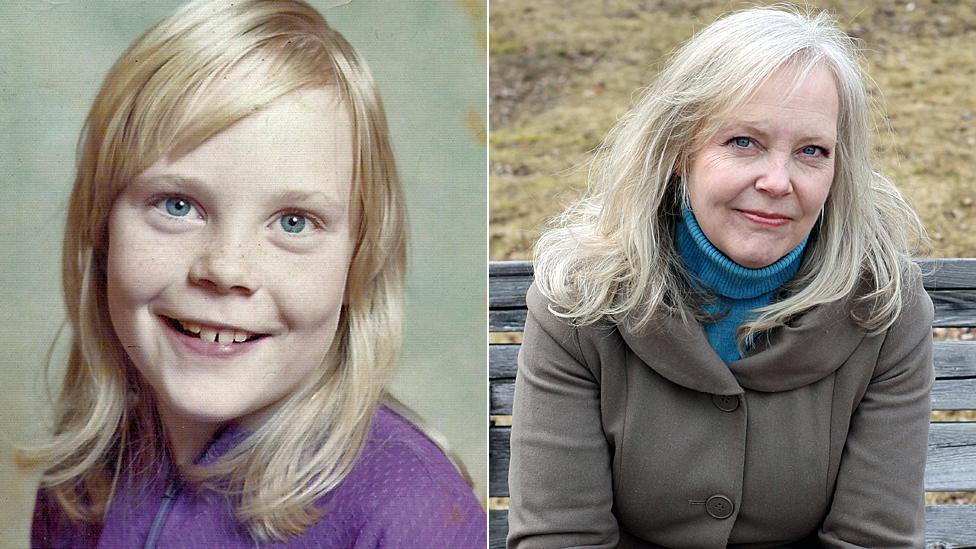
Pauline Dakin's childhood in Canada in the 1970s was full of secrets, disruption and unpleasant surprises. She wasn't allowed to talk about her family life with anyone - and it wasn't until she was 23 that she was told why.
Read: 'The story of a weird world I was warned never to tell'

Join the conversation - find us on Facebook, external, Instagram, external, YouTube, external and Twitter, external.
